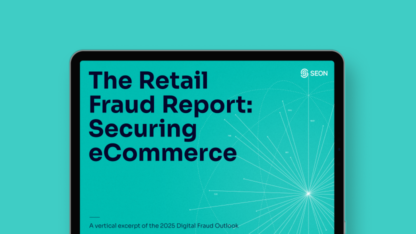What Is Disposable Email?
A disposable email is a unique email address that is temporary. It expires after a set amount of time or a set number of uses.
According to one survey, as much as 60% of all email in the US is sent using disposable email addresses – automatic business notifications will often create temporary, disposable addresses. Disposable email can deliver benefits for users in terms of keeping their data private and fighting spam, but it can also be an indicator of a user’s riskiness or even propensity for fraud. Email verification software and tools will detect and consider the use of a disposable email address when assessing overall risk.
To see such a tool in action, try SEON’s free reverse email lookup below. Try entering a disposable email to see what the tool returns, and see if you would trust the result if you were a fraud team member.
How Does Disposable Email Work?
Disposable email services provide the user with a temporary email address, often in just a few clicks. The address then expires after a set time, usually a few minutes. Most services enable users to generate multiple addresses.
One feature of disposable email services is that they let individuals sign up for temporary email addresses without having to submit the reams of personal information that most services seem to require these days. Some don’t require any information at all, so users can remain completely anonymous. This anonymity is presented as a perk, even though customer-facing businesses may think otherwise.
There are hundreds if not thousands of disposable email services operating through apps, websites, and browser extensions.
Is a Disposable Email Address the Same as an Alias Email?
The terms “disposable email address” and “alias email” are sometimes used interchangeably, but they are actually two different things. An alias email will have the same domain as the individual’s main email address (Gmail, for example) and will remain operational until the user deletes it – it won’t expire after a set period, so is suitable for long-term use. Alias email addresses can also pass disposable email address validations that are often used by fraud prevention tools, which disposable emails cannot.
Why Is Disposable Email Important?
Disposable email is important to individuals as it can help them avoid receiving spam emails and keep their data private. Many websites these days require customers to enter an email address before they can make a purchase or access services. Even news sites, blogs, and research paper publishers often now ask for an email address before an individual can access their content.
The individual may then end up on a mailing list for emails they don’t want. Not only that but if the data that the company stores is compromised, the individual’s email address (and possibly other credentials) may well end up in the hands of cybercriminals. Using a unique, temporary email address instead of giving out a primary email address is therefore an important tool for individuals who wish to avoid this.
One further benefit is that disposable email addresses can help individuals who need to bypass geo-restrictions, just as Tor and virtual private network (VPN) clients can. If a website requires an individual to enter an email address from a certain country in order to access its content, they can use a disposable email address that meets the site’s requirements.
Finally, disposable email addresses can serve as a defense against phishing. After all, if a cybercriminal obtains an individual’s email address, but that email expires after a short while, it is of far less use to the fraudster.
Why Are Disposable Emails a Problem?
While disposable email addresses may benefit the individuals who use them, they can cause a range of problems for businesses:
| Free service abuse | Fraudsters may use disposable email addresses to repeatedly access trial offers, discounts, and introductory bonuses, meaning that businesses must look out for the use of disposable emails to avoid bonus abuse and the abuse of free trials, referral fraud, and so on. |
| Inaccurate data analytics | People using disposable email addresses can cause numerous issues for businesses looking to make data-driven decisions. From open and click-through rates for your marketing emails to your customer churn rate, email addresses that return bounces after only a few minutes’ use can play havoc with analytics data. |
| Reputational damage | For marketers with lists full of disposable email addresses, the resulting high bounce rate can have broader consequences than inaccurate data reporting. A high bounce rate could see the company’s emails deemed to be spam, resulting in blacklisting and suspension by mailing services and email service providers. This creates problems for the business when it then tries to email its contacts. |
| Wasted expenditure | From advertising revenue to brand promotion to content generation – plus everything in between! – getting your company name well-known enough for users to sign up for your service can be pricey. When a customer signs up using a disposable email address, you are missing an opportunity to build a longer-term relationship with them – an opportunity that all of your marketing work has funded. |
| Fraudulent transactions | In addition to legitimate users who want to keep their data private, disposable email addresses are also used by fraudsters to create fake accounts. This opens up the potential for a wide range of fraudulent transactions – something against which every business must guard. |
How to Protect Against Disposable Email Abuse
One way to protect against disposable email abuse is to work hard to build a reputation that earns customers’ trust. Delivering outstanding products or services, backed by a customer care team that genuinely cares, is the best foundation for building that trust.
A wide range of email verification software and tools is available to support businesses to protect against email abuse, including using disposable email addresses. Some of the ways they can do so include:
· Email profiling uses data enrichment to discover whether an email address could be suspicious, including by checking it against known databases.
· Email validation APIs can automatically identify emails from disposable email address services.
· Server-side email validation apps can also detect emails from known disposable address providers.
Businesses can, of course, also update their email lists manually by emailing contacts and then deleting any that return bounces. However, the larger the business, the more labor-intensive this process becomes.
Improve your risk management with SEON’s real-time data enrichment tools, behavioral checks, and deep device fingerprinting analysis.
Ask an Expert
How Does Disposable Email Validation Fight Fraud?
Businesses can use disposable email validation as part of their anti-fraud measures. Identifying high volumes of disposable emails being used to register can help to uncover issues such as referral fraud or bonus abuse. If these emails are causing a noticeable ripple in revenue streams, fraud monitoring platforms like SEON can be customized to assign a risk score to registrations using disposable addresses, then prevent them from registering at all, stopping the potential for bonus abuse and referral fraud that they carry.
Disposable email validation should form part of Know Your Customer (KYC) verification processes and Know Your Business (KYB) checks. Validation can also be carried out on entire databases of email addresses (or perhaps on samples of them to investigate whether the company has a problem with disposable emails).
By using automated tools to identify disposable email addresses, businesses can put systems in place that flag the addresses and take action based on rules the company has defined. This level of email scrutiny is an important part of a robust anti-fraud approach.







